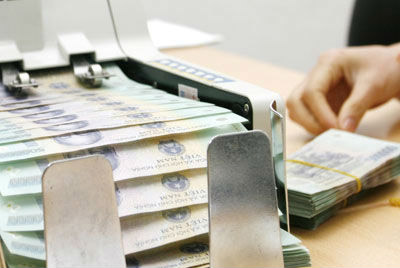Experts shine light on bank rate controversy
 |
Last week several banks rolled out lending packages at highly competitive rates to woo borrowers.
Accordingly, lending rates for production businesses are holding at around 6-7 per cent. Ocean Bank even offered personal loans at 5.91 per cent.
Member of the National Financial and Advisory Policy Council Le Xuan Nghia applauded banks for their actions.
“Banks lending at rates equal to or below the current deposit interest cap of 7 per cent was due to them having access to low cost capital from international organisations as well as government and business deposits. This does not mean, however, that the government’s grip on the lending rate will be loosened,” Nghia explained.
The lending rate remains considerably relaxed compared to 2012, but as of late August more than 25 per cent of loans still marked over 13 per cent.
According to senior economist Nguyen Minh Phong, this year’s inflation may hit 7.5 per cent, surpassing the government’s target of around 7 per cent. This will make it difficult for bank’s to further scale down their interest rates.
Given this conflict between deposit and lending rates, some experts are arguing that it is time for the State Bank of Vietnam (SBV) to relent on the mobilising cap.
Between 2012 and now, the SBV revised its deposit rate cap several times. In early June 2012 the central bank had no rate ceiling for 12-month term and over deposits.
A year later, it went even further to remove the cap on deposits with a six-month and over term.
According to the SBV’s Monetary Policy Department, after the SBV removed the cap for six-month deposits, the market has remained fairly stable. The competition between banks for market share has been healthy.
Even as banks reduced their deposit rates, this did not stop customers from putting their money in banks.
By mid-September, VND deposits jumped 13.78 per cent against the end of 2012.
These factors suggest the time may be right to dissolve the deposit rate ceiling.
Some experts, though, argue that removing the cap would hurt the liquidity of small banks.
They said also that removing the cap is risky at a time of surging inflation and as problems with underperforming banks had yet to be tackled.
What the stars mean:
★ Poor ★ ★ Promising ★★★ Good ★★★★ Very good ★★★★★ Exceptional
Latest News
More News
- Cashless payments hit 28 times GDP in 2025 (February 04, 2026 | 18:09)
- SSIAM and DBJ launch Japan Vietnam Capital Fund (February 04, 2026 | 15:57)
- Banks target stronger profits, credit growth in 2026 (February 04, 2026 | 15:43)
- Vietnam on path to investment-grade rating (February 03, 2026 | 13:07)
- Consumer finance sector posts sharp profit growth (February 03, 2026 | 13:05)
- Insurance market building the next chapter of protection (February 02, 2026 | 11:16)
- NAB Innovation Centre underscores Vietnam’s appeal for tech investment (January 30, 2026 | 11:16)
- Vietnam strengthens public debt management with World Bank and IMF (January 30, 2026 | 11:00)
- Corporate bond market poised for stronger growth cycle (January 28, 2026 | 17:13)
- Vietnam's IPO market on recovery trajectory (January 28, 2026 | 17:04)
















 Mobile Version
Mobile Version